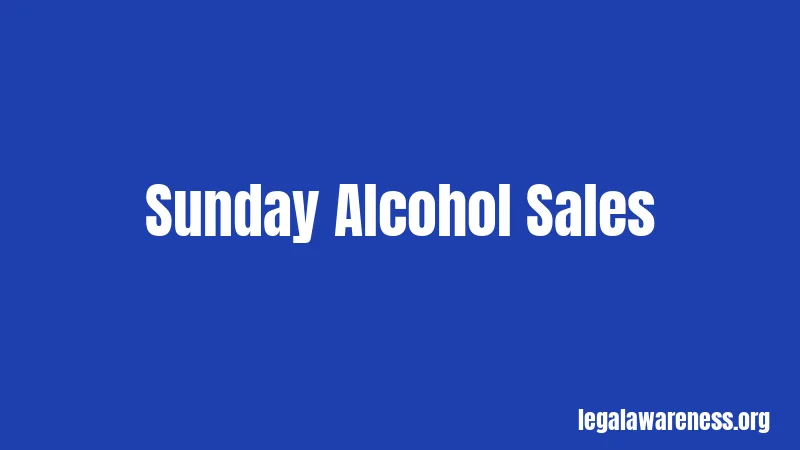Blue Laws in Michigan (2026): What’s Still Banned on Sundays
Ever tried to buy a car on Sunday in Michigan? You couldn’t, even if you wanted to. Most people have no idea certain activities are actually illegal on Sundays in this state. Seriously. Michigan still enforces blue laws that have been around since the 1950s. Let’s break down exactly what you can and can’t do on Sundays.
What Are Blue Laws Anyway?

Blue laws restrict certain activities on Sundays. They’re called “blue laws” because of their religious origins. Historically, Sunday was meant to be a day of rest and church. These laws banned work and shopping on the Sabbath.
Most blue laws disappeared decades ago. But some states, including Michigan, kept a few around. Michigan’s blue laws mainly focus on two things: car sales and alcohol.
The Car Sales Ban on Sundays
Here’s the big one. You cannot buy or sell a car on Sunday in most of Michigan.
This law has been around since 1953. Governor Mennen Williams signed Act 66 into law on May 12, 1953. The law bans all car dealerships from doing business on Sundays. That means no buying, selling, trading, or even negotiating car deals.
Wait, it gets interesting. The car dealers actually wanted this law. Yep, you read that right. Back in 1953, dealers were competing by staying open seven days a week. They wanted a guaranteed day off. So they lobbied the state to pass this law.
Which Counties Does This Apply To?
The Sunday car sales ban only applies to counties with populations over 130,000. When the law passed in 1953, only eight counties met that requirement. Now, 17 counties are covered by the ban.
Here are the counties where you can’t buy a car on Sunday:
Berrien, Calhoun, Genesee, Ingham, Jackson, Kalamazoo, Kent, Livingston, Macomb, Monroe, Muskegon, Oakland, Ottawa, Saginaw, Saint Clair, Washtenaw, and Wayne.
If you live in a smaller county, dealerships can legally operate on Sundays. Pretty straightforward, right?
What Exactly Is Banned?
The law is very specific. Dealers cannot open their doors on Sunday. They cannot buy, sell, trade, or exchange vehicles. They can’t participate in negotiations. They can’t even show cars to potential buyers.
This applies to both new and used car dealerships. It covers online transactions too. If a dealer conducts any business on Sunday, they’re breaking the law.
What About Other Vehicles?
Hold on, this part is important. The law only covers traditional motor vehicles. That means cars and trucks.
Recreational vehicles are not included. Boats, snowmobiles, motorcycles, and trailers don’t count. Dealerships can sell these on Sundays without any problem.
Penalties for Breaking the Law
Violating the Sunday car sales ban is a misdemeanor. A dealership caught doing business on Sunday could face serious consequences.
The court has several options. They can impose fines. They can order jail time. They can suspend the dealer’s license. They can even permanently revoke the license to do business in Michigan.
Most dealers just close on Sundays. It’s not worth the risk.
Sunday Alcohol Sales

Michigan’s alcohol laws on Sundays are less strict than they used to be. You can buy alcohol on Sundays. But there are some time restrictions you should know about.
When Can You Buy Alcohol?
Statewide, alcohol sales are banned between 2 a.m. and 7 a.m. every day. This applies to all types of alcohol. Beer, wine, and spirits all follow the same rule.
On Sundays specifically, some areas had additional restrictions. Basically, local governments can choose to ban alcohol sales before noon on Sunday. Or they can ban sales for the entire day.
Most areas in Michigan now allow Sunday alcohol sales. But it varies by county, city, and township.
The Sunday Morning Permit
Bars and restaurants can get a special permit. It’s called the Sunday Sales A.M. permit. This permit costs $160 per year.
With this permit, businesses can sell alcohol starting at 7 a.m. on Sunday. Without it, they have to wait until noon in areas with local restrictions.
Hillsdale County’s Special Situation
Okay, pause. Read this carefully. Hillsdale County is unique in Michigan.
It’s the only county that still bans on-premises liquor sales on Sundays. That means bars and restaurants cannot serve spirits or mixed drinks from 7 a.m. Sunday to 2 a.m. Monday.
Beer and wine? Those can be sold. Liquor bottles to take home? Also allowed. But you cannot sit in a bar and order a whiskey on Sunday in Hillsdale County.
This law has been around since 1980. Local residents have tried to repeal it multiple times. So far, they haven’t gathered enough signatures to get it on the ballot.
Wondering if this will change? State lawmakers introduced bills in 2025 to make it easier to repeal the ban. The legislation would reduce the number of signatures needed. It would also make the ballot language clearer. The issue might appear on the 2026 ballot if enough people support it.
Where Does Alcohol Come From?
Here’s something interesting. In Michigan, you can buy beer and wine at regular stores. Gas stations, grocery stores, and convenience stores all sell them.
Spirits are different. Hard liquor is only sold at licensed liquor stores. These are regulated more strictly.
Why Do These Laws Still Exist?
You might wonder why Michigan keeps these old laws. Good question.
The car sales ban remains popular with dealers. They like having a guaranteed day off. Many dealership employees work 50-60 hours per week across six days. Sunday closures give them family time.
There’s also an economic argument. Dealerships save money by closing one day a week. Cars aren’t impulse purchases. People who need a car will buy it on another day.
The alcohol restrictions reflect community values. Local governments have the power to set their own rules. Some areas want to limit alcohol availability on Sundays. Others don’t care.
Recent Changes and Updates

Michigan’s blue laws have evolved over time. The state used to have many more Sunday restrictions. Most of those disappeared.
In 2010, the state changed liquor laws to allow more Sunday sales. Before that, buying alcohol on Sunday was much harder. The “Brunch Bill” mentality spread across the country. Michigan followed the trend.
Car sales remain the big exception. The 1953 law hasn’t changed. Several attempts to repeal it have failed. Dealers actively lobby to keep the ban in place.
What This Means for You
Let me break down the practical impact. If you’re shopping for a car, plan for Saturday or weekdays. Sunday browsing isn’t an option in most of Michigan.
For alcohol purchases, check your local rules. Most areas allow Sunday sales now. But timing matters. Don’t expect to buy liquor at 8 a.m. on Sunday morning without checking if the business has the right permit.
If you live in Hillsdale County, plan ahead for Sunday gatherings. You can’t order cocktails at restaurants. But you can buy bottles to take home. Stock up on Saturday if you’re hosting Sunday brunch.
How Michigan Compares to Other States
Michigan isn’t alone in having blue laws. Thirteen states completely ban car sales on Sundays. These include Colorado, Illinois, Indiana, Iowa, Louisiana, Maine, Minnesota, Missouri, New Jersey, North Dakota, Oklahoma, Pennsylvania, and Wisconsin.
Some states take different approaches. Texas and Utah require dealers to close one weekend day. They can choose Saturday or Sunday, but not both.
Maryland allows Sunday car sales in only four counties. Nevada bans new car sales on Sunday but allows used car sales.
For alcohol, Michigan is actually pretty relaxed compared to some states. Mississippi bans all alcohol sales on Sunday. Arkansas has 39 completely dry counties. New Mexico doesn’t allow any alcohol sales on Sunday.
Are Blue Laws Constitutional?
This is a fair question. Blue laws seem to favor religion. Shouldn’t that violate separation of church and state?
The U.S. Supreme Court has ruled on this multiple times. They’ve consistently said blue laws are constitutional. The court’s reasoning? Blue laws serve secular purposes.
They give workers a guaranteed day of rest. They protect families. They contribute to social stability. The religious origins don’t matter if the current purpose is secular.
Not everyone agrees with this reasoning. But it’s the law of the land for now.
Enforcement and Violations
You might wonder if these laws are actually enforced. Totally.
Car dealerships take the Sunday ban seriously. State regulators monitor compliance. The penalty of losing a dealer license is too severe to risk.
Alcohol violations happen more often. Police and liquor control agents conduct inspections. Selling alcohol outside permitted hours can result in fines. Repeated violations can cost a business its liquor license.
If you see a violation, you can report it. The Michigan Liquor Control Commission handles alcohol complaints. The Secretary of State oversees car dealership licensing.
The Future of Blue Laws in Michigan
Will these laws ever change? Maybe.
The Hillsdale County alcohol ban might be repealed soon. Lawmakers are making it easier for voters to decide. If the 2026 ballot includes this issue, residents will finally have their say.
The car sales ban seems more permanent. Dealers don’t want it repealed. Lawmakers aren’t pushing for change. Most residents don’t care enough to fight it.
Michigan seems comfortable with its current blue laws. They’re a quirky part of the state’s legal landscape. Unless public opinion shifts dramatically, expect them to stick around.
What If You Break a Blue Law?
Let’s talk consequences. If you’re a regular person, you probably can’t break these laws. You need to be in the business to violate them.
Car dealers face criminal charges for Sunday sales. It’s a misdemeanor offense. Penalties can include fines, jail time, and license suspension or revocation. The exact punishment is up to the court.
For alcohol violations, businesses risk losing their liquor license. This is a huge financial penalty. Most bars and restaurants can’t survive without the ability to sell alcohol. They take compliance seriously.
Individual customers won’t get in trouble for trying to buy a car or alcohol at the wrong time. The penalty falls on the business, not the buyer.
Frequently Asked Questions
Can I buy a car on Sunday anywhere in Michigan?
Yes, but only in counties with fewer than 130,000 residents. The ban applies to Michigan’s 17 most populous counties. Smaller rural counties allow Sunday car sales.
What happens if I sign a car contract on Saturday but pick up the car on Sunday?
The dealership cannot legally complete any transaction on Sunday in restricted counties. You would need to wait until Monday to finalize everything and take possession of the vehicle.
Can bars serve alcohol on Sunday in Michigan?
Yes, statewide bars can serve alcohol on Sunday starting at 7 a.m. with the proper permit. Without the Sunday A.M. permit, local rules may require waiting until noon. Hillsdale County is the exception where spirits cannot be served on premises on Sunday.
Are online car sales affected by the Sunday ban?
Yes. The law prohibits any buying, selling, trading, or negotiation on Sunday. This includes digital platforms and online transactions. If the dealer is located in a restricted county, they cannot process Sunday sales even online.
Why do car dealers support keeping the Sunday ban?
Dealers appreciate having a guaranteed day off for their employees. Dealership work is demanding with long hours. The Sunday closure helps with work-life balance and reduces operating costs without significantly impacting sales.
Final Thoughts
Michigan’s blue laws are a mix of history and practicality. The Sunday car sales ban seems outdated to some people. To others, it’s a sensible worker protection.
Alcohol restrictions have loosened over the years. Most Michiganders can now buy beer, wine, and spirits on Sunday without much hassle. Hillsdale County remains the exception.
Stay informed about your local rules. Sunday regulations can vary by county and city. When in doubt, check with local authorities or the business itself.
Now you know what you can and can’t do on Sundays in Michigan. Plan accordingly, and you’ll avoid any surprises.
References
- Michigan Compiled Laws, Act 66 of 1953 – Sale of Motor Vehicles on Sunday – https://legislature.mi.gov/Laws/MCL?objectName=mcl-435-251
- Michigan Compiled Laws, Section 436.2114 – Hours of Sale for Alcoholic Beverages – https://legislature.mi.gov/Laws/MCL?objectName=mcl-436-2114
- Michigan Automobile Dealers Association – Sunday Sales FAQ – https://www.michiganada.org/faq/general-questions/
- Michigan Liquor Control Commission – Enforcement Information – https://www.michigan.gov/lara/bureau-list/lcc/faq/enforcement-information
- Hillsdale Collegian – Blue Law Repeal Effort Coverage (2024-2025) – https://hillsdalecollegian.com/
